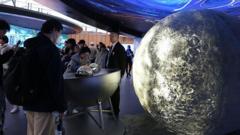This unique collaboration comes despite the on-going trade war, highlighting a potential emphasis on the importance of scientific advancement above political disputes.
China Opens Moon Rock Samples to US Scientists Amid Ongoing Trade Strain

China Opens Moon Rock Samples to US Scientists Amid Ongoing Trade Strain
As the US-China trade tensions persist, China extends an opportunity for scientific collaboration by allowing American scientists access to its lunar samples collected from its Chang'e-5 mission in 2020.
In a groundbreaking move for international collaboration amidst ongoing trade tensions, China has opened its lunar samples collected from the Chang'e-5 mission for examination by scientists from six countries, including the United States. The Chinese National Space Administration (CNSA) made the announcement, signaling a commitment to shared scientific endeavors despite existing political strains.
CNSA chief Shan Zhongde described the samples as "a shared treasure for all humanity," emphasizing their universal value. However, Chinese scientists face restrictions when seeking access to NASA's lunar samples due to a 2011 US law prohibiting NASA from collaborating with China without explicit Congressional approval. This has created a one-sided dynamic, where the US can examine China's samples but not vice versa—a point highlighted by experts such as John Logsdon, former director of the Space Policy Institute at George Washington University.
Logsdon insists that while the US maintains strict controls on many aspects of space technology, the scientific investigation of lunar samples lacks any military significance, thus emphasizing a normative aspect of international scientific cooperation between countries regardless of their political relations.
The trade tensions between the two nations have grown increasingly complex, with the US imposing tariffs that can reach up to 245% on Chinese goods, while China responded with its own tariffs on US imports reaching 125%. Although former President Trump had signaled potential avenues for de-escalating the trade war, no substantial negotiations have been confirmed by either side.
This year, the CNSA invited applications from global researchers to study the Chang'e-5 samples, which Dr. Logsdon noted are "a billion years younger" than those collected during the Apollo missions, suggesting more recent volcanic activity on the Moon than previously understood. The US institutions that were awarded access include Brown University and Stony Brook University, alongside institutions from France, Germany, Japan, Pakistan, and the UK.
Shan expressed his hope that China's engagement in international space cooperation would continue to expand, within the framework of initiatives like the Belt and Road Initiative, thereby fostering an ever-growing network of scientific collaboration.
As nations focus on overcoming geopolitical challenges through science, the exchange of lunar samples could signify a new chapter of cooperation in space exploration, reaffirming the notion of collective human effort in addressing shared challenges.
CNSA chief Shan Zhongde described the samples as "a shared treasure for all humanity," emphasizing their universal value. However, Chinese scientists face restrictions when seeking access to NASA's lunar samples due to a 2011 US law prohibiting NASA from collaborating with China without explicit Congressional approval. This has created a one-sided dynamic, where the US can examine China's samples but not vice versa—a point highlighted by experts such as John Logsdon, former director of the Space Policy Institute at George Washington University.
Logsdon insists that while the US maintains strict controls on many aspects of space technology, the scientific investigation of lunar samples lacks any military significance, thus emphasizing a normative aspect of international scientific cooperation between countries regardless of their political relations.
The trade tensions between the two nations have grown increasingly complex, with the US imposing tariffs that can reach up to 245% on Chinese goods, while China responded with its own tariffs on US imports reaching 125%. Although former President Trump had signaled potential avenues for de-escalating the trade war, no substantial negotiations have been confirmed by either side.
This year, the CNSA invited applications from global researchers to study the Chang'e-5 samples, which Dr. Logsdon noted are "a billion years younger" than those collected during the Apollo missions, suggesting more recent volcanic activity on the Moon than previously understood. The US institutions that were awarded access include Brown University and Stony Brook University, alongside institutions from France, Germany, Japan, Pakistan, and the UK.
Shan expressed his hope that China's engagement in international space cooperation would continue to expand, within the framework of initiatives like the Belt and Road Initiative, thereby fostering an ever-growing network of scientific collaboration.
As nations focus on overcoming geopolitical challenges through science, the exchange of lunar samples could signify a new chapter of cooperation in space exploration, reaffirming the notion of collective human effort in addressing shared challenges.


















